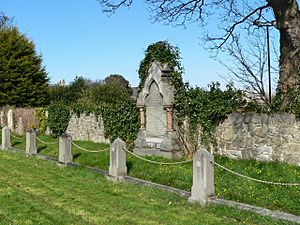Walter Berwick facts for kids
Walter Berwick (1800–1868) was an important Irish judge. He was well-liked by many people, especially in Cork city. Sadly, he died in a big train accident called the Abergele rail disaster in 1868. In Cork, there is a special fountain named the Berwick Fountain. It stands on the Grand Parade to remember him. Walter Berwick also led an official investigation into a conflict known as the Dolly's Brae conflict in 1849.
Early Life and Important Work
Walter Berwick was born in Leixlip, County Kildare. His father was Reverend Edward Berwick, a vicar.
In 1849, Walter Berwick led an important investigation. This inquiry looked into a conflict known as the Dolly's Brae conflict. As a result of his findings, three local officials were removed from their positions.
This investigation also led to a new law. It was called the Party Processions Act of 1850. This law made all political parades illegal in Ireland. However, many people did not like this law, and it was removed in 1872.
The Berwick Fountain in Cork
For several years, Walter Berwick worked in County Cork. He was like the main judge for the local courts there. People knew him for being fair and honest. He became a very popular person in Cork.
He was also one of the first judges to talk about "suspended sentences." This is when a judge decides to delay a prison sentence.
In 1859, Walter Berwick became a judge for the Irish Court of Bankruptcy. The people of Cork wanted to thank him for his great service. Berwick was very touched by their kindness.
To show his thanks, he paid for the Berwick Fountain to be built. He wanted it to be "in remembrance of the great kindness shown to me by all classes in Cork." Sir John Benson, a famous architect from Cork, built the fountain. It was finished in 1860. The fountain still stands on the Grand Parade today, though it was moved slightly in 2007.
See also
- Abergele rail disaster
- Dolly's Brae conflict
- Grand Parade, Cork
- Party Processions Act
 | Janet Taylor Pickett |
 | Synthia Saint James |
 | Howardena Pindell |
 | Faith Ringgold |


